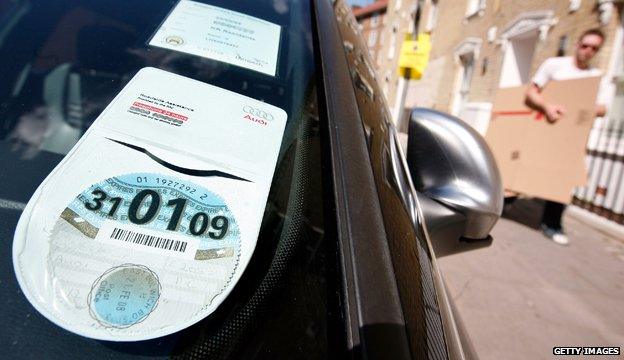Car tax disc to be axed after 93 years
- Published
- comments

The tax disc to show motorists have paid vehicle excise duty is to be replaced with an electronic system, Chancellor George Osborne has announced in his Autumn Statement.
The disc was introduced in 1921 but officials say it is no longer needed with the DVLA and police now relying on an electronic register.
The new system will allow people to pay the charge by monthly direct debit.
The Treasury said it showed government was moving "into the modern age".
It would also make "dealing with government more hassle free", a spokesman added.
At present, motorists are able to choose whether they pay VED in twelve or six month instalments.
The latter option costs 10% extra each year, but this is expected to be cut to 5%.
The new option of paying by monthly direct debit is also expected to cost 5% more than paying for a full year in one go.
The changes are expected to come into effect in October 2014.
In the 2012 Budget, external, the government announced its intention to bring in a direct debit system for paying VED and said it would seek the views of motoring groups on the merits of such a change.
It also said it would "consider whether to reform VED over the medium term".
A spokesman for the Driver and Vehicle Licensing Agency (DVLA) said the body received approximately 160,000 reports from members of the public of potentially untaxed vehicles last year.
200,000 drivers in all were spotted having not paid VED last year, by the public or by the authorities - or by both, he added.
The DVLA also took action against 600,000 drivers whose non-compliance was revealed by analysis of its records, he said.
"Evasion is estimated at 0.6% - the second lowest figure ever," he concluded.
On Twitter, presenter of BBC Radio 4's Money Box Paul Lewis wondered, external how prospective buyers of second-hand cars would know in future when the vehicle excise duty paid would expire.
"How will people tell if [a] vehicle's been abandoned?" he added.
After the demise of the paper disc, the Telegraph's Steve Hawkes said, enforcing the digital system would entail greater use of surveillance cameras.
"More personal data lodged and presumably sold on then," he commented, external.
Vehicle tax was introduced in the 1888 Budget and the system of excise duty applying specifically to motor vehicles was introduced with the Roads Act 1920, with the tax disc appearing the following year.